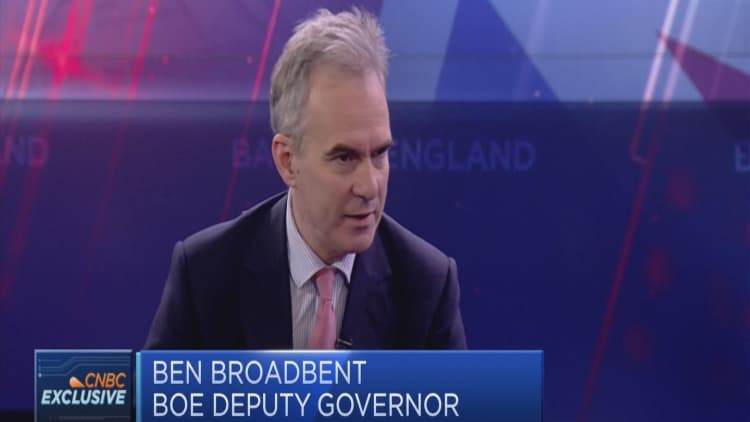
The next two to three months will be critical for the future of the U.K. economy, Ben Broadbent, deputy governor of the Bank of England, told CNBC Monday.
The U.K. government is racing against the clock trying to clinch a deal with the European Union in the coming weeks. The idea is to have an agreement on how the U.K. will leave the EU in March of next year with enough time for parliamentary approval both in the U.K. and across Europe.
"The sequence of events over the next two to three months could change the outlook materially," Broadbent told CNBC's Joumanna Bercetche.
Following a monetary policy meeting earlier this month, the BOE said the U.K. is set to grow 1.7 percent in 2019 and inflation is likely to hit 2.1 percent during the same period. The central bank's forecasts are based on an assumption that the U.K. will strike a deal with the EU and keep relatively close trade links with the bloc.
"I still think it's the most likely outcome but, of course, over time, every day there are headlines, positive, negative, which will send the currency in particular in one direction or the other," Broadbent said Monday.
Sterling was once again under pressure Monday morning on the back of negative headlines about Brexit. The British media were reporting divisions within Prime Minister Theresa May's circle of key lawmakers, with potentially further resignations from the administration.
Business investment and growth rates have been hit by the uncertainty surrounding the U.K.'s departure from the EU. The Office for National Statistics (ONS) said Friday that the U.K. economy expanded 0.6 percent in the three months to September, from 0.4 percent in the previous quarter. Broadbent told CNBC that growth has been "reasonably weak" over the last two years.
"That said and even though GDP (gross domestic product) growth has been weaker than certainly pre-crisis rates, it's been strong enough to allow the unemployment rate to fall further to reach 40-year lows and that in turn has been strong enough to push our wage growth which is momentarily higher since any time since the crisis," he said, mentioning that there are currently inflationary pressures.
The Bank of England kept its benchmark interest rates unchanged earlier this month, but it has raised rates twice since last year and since the global financial crisis of 2008. Following the November meeting, the BOE warned that despite good economic data, the lack of certainty over Brexit seemed to have hit business sentiment and could bring further volatility.
"The additional thing we have seen this year is an intensification of the drag on business investment from uncertainty about Brexit, investment has been relatively weak since the referendum, certainly compared to comparable economies …But that effect, I think, has intensified through the course of 2018," he said.
In spite of what happens to the Brexit talks, Broadbent told CNBC: "We will do whatever we think we have to do to meet the remit."
The central bank's target is to keep inflation at 2 percent.


